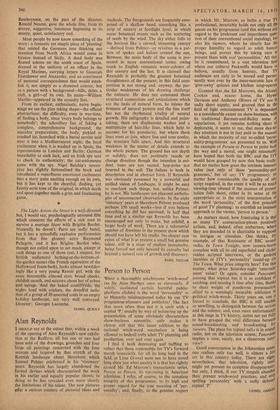Person to Person
WHAT a thoroughly mischievous 'witch-word' (as Sir Alan Herbert once so vigorously, if vainly, castigated certain harmful public- platform clichés) is the word 'personality' as so blatantly misinterpreted today by our TV programme-planners and publicists! The fact that more often than not it is spelt with a capital 'P.' usually by way of bolstering up the presentation of some obviously characterless show-business nonentity, only makes it clearer still that this latest addition to the national witch-word vocabulary is being allowed to bedevil truly adult TV planning and production, over and over again.
I find it both depressing and baffling to reflect that those responsible for TV's forward march (especially, for all its long lead in the field, at Lime Grove) seem not to have noted long since just what quality it is that has rightly
earned Mr. Ed Murrow's transatlantic series, Person to Person, its ton-rating in American television. I refer, of course, to the complete integrity of this programme; to its high and proper regard for the true meaning of 'per- sonality'; and, finally, to the genuine respect in which Mr. Murrow, as befits a true TV profesiional, invariably holds not only all the guests on his programme (and this without any regard to the irrelevant and impertinent ques' lion of their conventional social standing), but also his viewers, whom he clearly has the proper humility to regard as adult human beings, and proves this by taking care to present them with real 'personalities.' All this. be it remembered, in a vast television field where our cultural Pecksniffs would have us believe, usually from hearsay, that TV audiences are only to be wooed and perms; nently won over by the mass-moronic lure of 'give-away' quizzes and kitchen soap-operas.
Granted that ,the Ed Murrows, the Alistair Cookes and, nearer home, the Hywel Davieses and Anthony Olivers of TV are in sadly short supply; and granted that in the field .of light entertainment TV is dependent to a considerable extent on show-business, with its traditional Barnum-and-Bailey sense of, superlatives, it yet remains nothing short of deplorable, it seems to me, that more day-ter day attention is not in fact paid to the manner in which the majority of our so-called 'perso' nality-programmes' are presented to us. With the example of Person to Person to point both the way and a moral, one might reasonably have hoped that both the BBC and the ITV would have grasped by now this basic truth: that no matter how great the intrinsic interest' value (not only of these 'personality-pro grammes,' but of any TV programme); no matter how considerable the quality of any script required, in the event it will be so much viewing-time abused if the manner of prose' tation falls short, either in its sense of the appropriate or in the strict interpretation of the word 'personality,' of the first principle of good TV planning: to establish an intimate approach to the viewer, 'person to person.'
As matters stand, how frustrating it is that so many TV conversation-pieces positively irritate, and, indeed, often embarrass, where, they are intended (it is charitable to suppose) to intrigue or stimulate. One thinks, for example, of that Rozinante of BBC sound. radio, In Town Tonight, now camera-borne complete with all its old superficial and elicit ridden scripted interviews, or the gushing inanities of ITV's 'personality' round-up On The Town. What price integrity here? For that matter, what price Saturday-night 'entertain' ment' value? Or again, consider Panorama' missing that topical bus it is so confident 01 catching, and missing it time after time, thanks to sheer weight of ponderous presentation, allied to a seemingly incurable addiction to political witch-words. Thirty years on, one it forced to conclude, the BBC is still unable' or unwilling, to distinguish between the sedans and the solemn; and, even more unfortunatelY at this stage in TV history, seems not yet full)' to have grasped the vital difference between sound-broadcasting and broadcasting for viewers. The place for topical talks is in sound' radio, not on the television screen; Panorama implies a view, surely, not a classroom inter view?
Good conversation in the Johnsonian sense' one realises only too well, is almost a lost art in this country today. There are signs,' nevertheless, that television, rightly used' might yet prevent its complete disappearance' but only, I think, if our TV moguls abandoll their present witch-word practices, and star i spelling 'personality' with a sadly debased capital 'P.'
LIONEL OAMIO


































 Previous page
Previous page